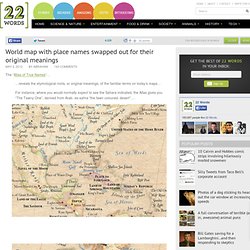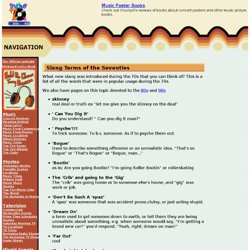

Linguists identify words that have changed little in 15,000 years. Neanderthal, cro-magnon, modern man may have shared words which remain to this day.

Photo: Monique Westermann You, hear me! Give this fire to that old man. Pull the black worm off the bark and give it to the mother. You Heard ’Em Here First: A Forecast of New Words in 2015. As 2015 tiptoes in, can we guess which new words we will be casually tossing around this time next year?

“You can never predict the future with language,” the British linguist David Crystal has said. He’s probably right, but let’s try anyway. For starters, we can look at a few quixotic attempts to popularize new words and see where they might have gone awry. One coinage is intended to solve the age-old confusion about whether “next weekend” refers to this coming weekend or the following one.
If interactive designers Ivan Cash and Jeremy Knight get their way, we will simply refer to the weekend after this one as “oxt weekend.” The website lobbying for this change to the language, oxtweekend.com, got some media attention recently, even though the site has been around since 2009. The English expressions coined in WW1.
22 February 2014Last updated at 01:37 GMT. Words and Phrases Coined by Shakespeare. Words and Phrases Coined by Shakespeare NOTE: This list (including some of the errors I originally made) is found in several other places online.

That's fine, but I've asked that folks who want this on their own sites mention that I am the original compiler. For many English-speakers, the following phrases are familiar enough to be considered common expressions, proverbs, and/or clichés. All of them originated with or were popularized by Shakespeare. I compiled these from multiple sources online in 2003. History of English. Etymology: Languages that have contributed to English vocabulary over time. In Borrowed Words: A History of Loanwords in English, I examine how words borrowed from different languages have influenced English throughout its history.

The British Library: Language & Literature Timeline. The History of English in 10 Minutes. How language changes over time. Oxford English Dictionary adds new sense of tweet to its Big Data. Deciding which new coinages to allow into the official record of the English language can be a tough and confusing job – or, as the Oxford English Dictionary now acknowledges it is possible to say, a headfuck.

World map with place names swapped out for their original meanings. The “Atlas of True Names“… …reveals the etymological roots, or original meanings, of the familiar terms on today’s maps…For instance, where you would normally expect to see the Sahara indicated, the Atlas gives you “The Tawny One”, derived from Arab. es-sahra “the fawn coloured, desert”….

(via Weasel King) Update: There is now a more in-depth version specifically for the United States. In the 70s - Slang Terms of the Seventies. Slang Terms of the Seventies What new slang was introduced during the 70s that you can think of?

80s Slang – It’s, like, toooo bitchin’ Terms of the 90s, Slang of the Nineties. No LOL matter: Tween texting may lead to poor grammar skills. Text messaging may offer tweens a quick way to send notes to friends and family, but it could lead to declining language and grammar skills, according to researchers.

Tweens who frequently use language adaptations -- techspeak -- when they text performed poorly on a grammar test, said Drew Cingel, a former undergraduate student in communications, Penn State, and currently a doctoral candidate in media, technology and society, Northwestern University. When tweens write in techspeak, they often use shortcuts, such as homophones, omissions of non-essential letters and initials, to quickly and efficiently compose a text message. "They may use a homophone, such as gr8 for great, or an initial, like, LOL for laugh out loud," said Cingel. "An example of an omission that tweens use when texting is spelling the word would, w-u-d.
" Cingel, who worked with S. Cingel gave middle school students in a central Pennsylvania school district a grammar assessment test. Language change quiz. Tweet geekery and epic crowdsourcing: an Oxford English Dictionary update. How the English language is, like, changing. A UK child is likely to say the word ‘like’ five times as much as his or her grandparents, language researchers say.

The word ‘love’ is used more than six times as often as ‘hate’, while ‘save’ is used with ‘money’ twice as often as the word ‘spend’. The research, which is part of the Cambridge English Corpus – a database of two billion words and thousands of hours of recordings – shows a marked decline in the correct use of grammar. The study found that MPs and other public figures are speaking more informally, with words like ‘gonna’ being used instead of ‘going to’. Brian Sewell, the art critic, and historian David Starkey are shown to use formal English, in contrast to Janet Street-Porter and footballer David Beckham, who use colloquial speech. Street-Porter responded to the study by writing in the Daily Mail: ‘Listen to Alan Sugar, David Beckham or Adele and it’s obvious that sounding downmarket no longer holds you back in life… Am I bovvered?
What we liked in 2013: words. Oh hi, is that a selfie of you twerking in the middle of a sharknado? Such is the pleasurable speed of linguistic invention that this perfectly normal sentence would have been incomprehensible to most people only a year ago. The word "selfie" first appeared in an Australian online forum in 2002, but this was the year it earned the title of Oxford Dictionaries Word of the Year. Oxford's editors also admired the word's fecund capacity for variation: a "shelfie" is a picture of your shelves, a "drelfie" a picture of you while drunk and a "belfie" is a picture of your arse.
Speaking of arses, a strong challenger to "selfie" was "twerk", a verb that was thrust to prominence by Miley Cyrus's remarkable performance at the MTV video music awards in August. Oxford speculates that it is "probably an alteration of work". Some new or unusual words see topical spikes in popularity then die away again. Beyond selfies and twerking … the words that really mattered in 2013. Big data This was a year in which sheer hugeness was exciting, as vividly demonstrated by Pacific Rim, Guillermo del Toro's excellent film about giant robots punching giant monsters in what passed for their giant faces.

Similar thrills attended the mainstreaming of the phrase "big data", which made everyone wonder in embarrassment how they had got along with their pathetic wad of tiny data for so long. Metadata Edward Snowden's revelations about government spying revealed nothing if not a triumph of big data for the organisation once jokingly referred to as the No Such Agency.
How authors from Dickens to Dr Seuss invented the words we use every day. Butterfingers Charles Dickens used the term in his 1836 The Pickwick Papers (more properly called The Posthumous Papers of the Pickwick Club): "At every bad attempt at a catch, and every failure to stop the ball, he launched his personal displeasure at the head of the devoted individual in such denunciations as 'Ah, ah! —stupid'—'Now, butter-fingers'—'Muff'— 'Humbug'—and so forth. " Chintzy Originally this word meant to be decorated or covered with chintz, a calico print from India, or suggestive of a pattern in chintz. It was extended to mean unfashionable, cheap or stingy, coming from none other than Mary Ann Evans, better known by her pen name George Eliot, who wrote in a letter in 1851: "The effect is chintzy and would be unbecoming. " Why Americans Call Soccer 'Soccer' How different country refer to the game of soccer.
The shades of pink are variations and literal translations of "football," blues are "soccer," and greens are other etymologies. ( reddripper/reddit ) New Zealand's largest newspaper is deeply conflicted. OED birthday word generator: which words originated in your birth year. Do you know which words entered the English language around the same time you entered the world? Use our OED birthday word generator to find out! We’ve scoured the Oxford English Dictionary (OED) to find words with a first known usage for each year from 1900 to 2004. Pain in the ananas: etymology maps. 12 Old Words that Survived by Getting Fossilized in Idioms. English has changed a lot in the last several hundred years, and there are many words once used that we would no longer recognize today.
For whatever reason, we started pronouncing them differently, or stopped using them entirely, and they became obsolete. 7 Words that Came About from People Getting Them Wrong. 1. Linguists reveal the 100 words that have shaped the English language. New_word_flowchart. Loanword. Visualizing English Word Origins. Borrowed Words in the English Language. Words in English: Loanwords. Loanwords. Forming New Words: Compounds, Clipped Words, and Blends in English. Portmanteau. A portmanteau ( The unstoppable march of hybrid bakery products. 9 October 2013Last updated at 14:41 GMT.
5 words you didn’t know were acronyms. Linguistics - What is morphology? » Angielski online. Morphology - definition and examples of morphology. The Grammar of Words: An Introduction to Linguistic Morphology, 2nd ed., by Geert E. Booij (Oxford University Press, 2007) Definition: Turning a scandal into a '-gate' The Word "The": Why the definite article in the English language is so difficult to define. 35 classy slang terms for naughty bits from the past 600 years.
BBC Radio 4 - Today, 28/05/2014, Children's changing use of language. English-loan-words.pdf. Why do we have silent letters in the English language? - Features - Books. English spellings don’t match the sounds they are supposed to represent. It’s time to change. BBC Radio 4 - Word of Mouth - Available now. 9 Old-Fashioned Tech Terms You Still Use Today.